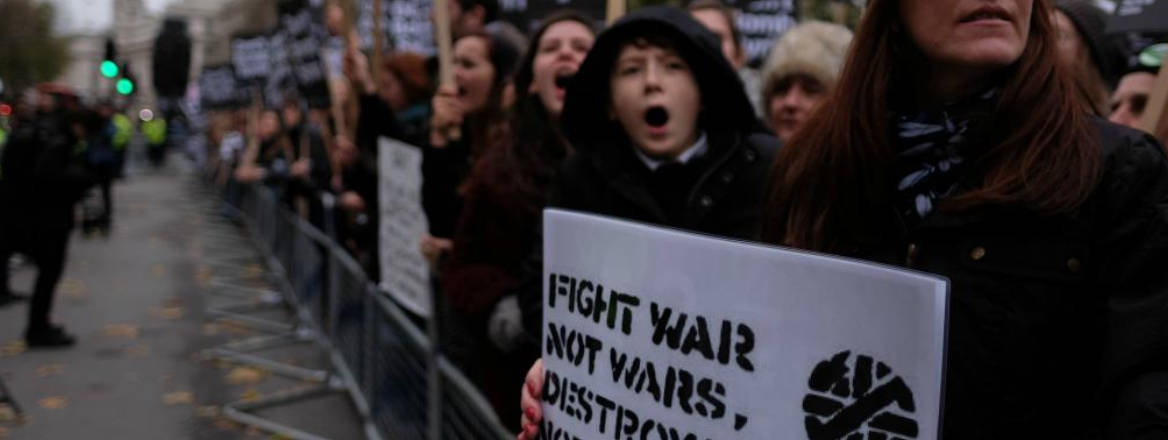The Decision to Go to War: How the British Public Misunderstands Its Legal Basis
British voters are vulnerably ignorant about the authority to go to war.
In her recent party conference speech, Prime Minister Theresa May lambasted Opposition Leader Jeremy Corbyn as someone who ‘poses as a humanitarian’ but insists that military action ‘is only justified with the approval of the Security Council – effectively giving Russia a veto’.
This point may have stirred her immediate audience but as polling on the subject shows, both Corbyn and the Kremlin have wider public ignorance in their favour on the UN debate.
When UK, French and US forces attacked Syrian chemical weapons facilities earlier this year, Corbyn was suitably quick to condemn missile strikes as ‘legally questionable’, largely because they were not explicitly authorised by the fifteen-member UN Security Council. This requires nine yes votes but can also be vetoed by a single no vote from one of its Permanent Five Members, or ‘P5’: Russia; China; France; the UK; and the US.
Thus the Western trio bypassed efforts to seek UN approval since they knew Russia would block the process to aid its ally, Syrian leader Bashar al-Assad. Unfortunately, public understanding of these realities is minimal.
In partnership with RUSI, the YouGov-Cambridge Centre recently conducted a set of survey experiments on British attitudes to authorising war. In the first of these, a nationally representative sample of the public was shown a list of statements and asked which one best describes what it means when military action has been officially authorised by the UN.
Answer options included several red herrings, such as ‘a majority of UN member-states have voted to support it’, that ‘the UN Secretary General’s Office has authorised it’, and that ‘UN legal experts have decided the action is lawful’. There was also an option saying ‘it means Russia, China and powerful Western countries have agreed to allow it’.
Only the last statement comes near to reality. But notably, just 7% of respondents chose it. Among the other options, 34% said authorisation means the majority support of UN member states, 19% thought it means approval by the Secretary General’s Office and 11% assumed it means UN legal experts have deemed the action lawful. About a quarter of respondents chose ‘Don’t know’, while 2% opted for ‘None of these’.
As these figures further imply, part of the problem for advocates of UK military action is a natural public tendency to blur conceptions of national and international society. While domestic law has an obvious, vertical structure enforced by the supreme authority of state, there is no such executive branch of the international system. In so far as there is a body of rules governing the interaction of states, it relies on a more horizontal structure of consent and collective enforcement. Hence many assume the UN blessing represents some higher judicial or supra-parliamentary verdict on legitimacy, when it is more practically a measure of great power alignment.
The contestable nature of international law also helps to account for competing judgements on the legality of the April missile strikes on Syria. While opponents of this action referred to Security Council process as the exclusive source of legal authorisation, Downing Street justified its intent to protect civilians from continued chemical attacks on the basis of customary international law – in other words obligations arising from established practice rather than formal written convention.
A major attempt to address the tension between legal and humanitarian norms emerged with Tony Blair’s momentous speech to the Chicago Economic Club in 1999, where he proposed a new ‘Doctrine of the International Community’. This essentially argued that in an ever-globalising world, there were times when obvious humanitarian need trumped the principle of sovereignty and the moral weight of liberal international community trumped the will of individual naysayers on the Security Council.
Popular history says the Blair Doctrine was later profoundly discredited in public eyes by the catastrophe of intervention in Iraq. But as polling further suggests, the British outlook remains distinctly Blairite in certain ways.
A comparable British sample was asked what it means when military action has been authorised by NATO, instead of the UN. Results again show a significant knowledge gap, with roughly half of people saying variously that NATO authorisation means ‘a majority of UN member-states have voted to support it’ (26%), or that action has been authorised under the (fictitious) ‘International Legal Charter’ (16%), or that ‘legal experts in the Hague’ have decided action is lawful (6%). Only 19% came nearer to reality with an option saying ‘it means a number of Western countries have agreed to protect each other’. About a third said ‘Don’t know’ while 2% chose ‘None of these’.
Crucially, there is also little difference between the perceived importance of securing UN and NATO support. One sample was asked if Britain should take military action only with UN authorisation or should be prepared to act without it, while another sample was asked the same question but referring to NATO authorisation instead. Results are nearly identical, with 45% of the first sample saying Britain should only act with UN authorisation, while 42% of the second sample stated we should only act with NATO authorisation. Roughly a third in each case thought the country should be prepared to act without the respective authorisation.
In other words, NATO and the UN play a similar role as legitimising stamps of endorsement, which further highlights two important points: first, that UN authorisation only really matters to public opinion for how it vaguely signifies the moral authority of broader multilateral support; and second, that many of us still consider the Western Alliance as a key source of that collective authority, whether consciously or subconsciously, and in notable contrast to the Corbyn worldview.
The polling further tested this by asking what kind of support or authorisation is most important to have when Britain takes military action. Respondents were shown six different options and asked to rank them in order of importance, including ‘majority approval by the UK Parliament’, ‘authorisation by the UN’, ‘authorisation by NATO’, the ‘support of key Western allies like the United States, France and Germany’, the ‘support of major humanitarian charities’, and the ‘support of China and Russia’.
Parliament tops the list with 46% ranking it first or second in order of importance. This is followed respectively by NATO authorisation (35%), the support of key Western allies (33%), UN authorisation (31%), humanitarian charities (14%), and finally the support of China and Russia (3%). Beyond the primacy of Westminster, then, respondents afford roughly similar weight to the endorsement of Western allies and the UN, and little to the verdict of Russia or China.
For better or worse, these are sentiments that Blair instinctively understood in his vision of international community. Much of the public can live without UN endorsement if they think the general sway of Parliament and Western consensus falls in favour.
This duly corresponds with other data suggesting the backlash against liberal internationalism has been overstated. Previous YouGov-Cambridge studies show significant support for various forms of intervention against Syrian President Bashar Al-Assad and the Islamic State group, including airpower, special forces, arming rebels and putting advisers on the ground (see results here and here).
By a similar token, other YouGov research indicates that when Parliament defeated the government and opposed Syrian airstrikes in 2013, it was Britain’s involvement in those particular circumstances of debate that many voters rejected, rather than the essential merits of a tough Western response to Assad. Low levels of polling support for recent missiles strikes in the country reflect a specific hesitancy about Middle Eastern quagmires, combined with general apathy towards the Syria debate after years of conscious neglect by Westminster. Yet we also find a majority would back enforcement of a Syrian no-fly zone.
If British fighting spirit endures, however, this is now clearly tempered by a lower tolerance for risk, a higher bar for justification and increased reverence for strong international endorsement. We are newly vulnerable to the lexicon of anti-war legalism, therefore, but much less to its underlying ideology, and can still be persuaded to bother if Western leaders can still be bothered to persuade.
Joel Faulkner Rogers is an academic pollster and military reservist. He writes in a personal capacity.
The views expressed in this Commentary are the author’s, and do not necessarily represent the views of RUSI or any other institution.
WRITTEN BY
Joel Rogers de Waal
RUSI Associate Fellow, RUSI International


